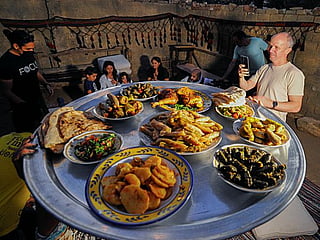Despite measures by authorities, surge seen in domestic violence in Egypt amid COVID-19 pressures
Government boosts safety net for vulnerable categories, cracks down on underage marriages

Cairo: A man in his 30s in Egypt’s southern province went on a murderous spree, killing his parents and two children of his sister while they were asleep, local media reported Sunday.
His 25-year-old sister was seriously injured in his cleaver attack. Neighbours claimed he is a drug addict and psychologically unstable.
In April, a gun-toting husband in the southern province of Fayyoum went to his in-laws’ house where he opened fire, killing his estranged wife, her sister and their child while seriously injuring his mother-in-law. Investigations revealed that the man got angry after his wife had left the marital house for her family’s in a protest over the husband’s refusal to get treated for drug addiction.
In the Delta province of Sharqia, a pensioner was arrested after he pushed his wife from the balcony of their house in a dispute over the household budget. The woman survived the attack with fractures.
Social pressure
Rarely does a day pass in Egypt without local media reports a gristly crime involving members of the same family, triggering fears of a spike in domestic violence in the country of over 100 million people amid economic and social pressure due to COVID-19.
Since the outbreak of the pandemic started early last year, the Egyptian government has been at pains to maintain a balance between protecting public health and keeping economy open.
The government has also offered financial assistance to casual, irregular workers who have borne the brunt of fallout from the virus-related restrictions. Authorities have, moreover, expanded a safety net for the country’s less fortunate categories through a nationwide state-funded support programme.
Rising global violence
Experts see various causes behind spiralling domestic violence ranging from local socio-economic pressure to rising global violence.
“Crime is as old as man on this earth and changes according to times and circumstances surrounding humans,” said Fathi Qenawi, a professor at the state-run National Centre for Criminal Research. “Nowadays, everyone has access to the Internet and can watch videos packed with violence everywhere in the world. Besides, violence is exported through most media, films and electronic games. Therefore, the crime has become more horrifying,” he told Arabic-language newspaper Al Shorouk.
Unemployment worldwide
Specialists see other factors. “Frustration resulting from a job loss or failure to play the traditional role within the family can lead to violence and crime,” said Hosni Abdul Latif, a sociologist. “Unemployment is no longer a problem facing a certain country. Millions of people around the world have lost their jobs in mass layoffs due to the COVID-19 economic repercussions,” he told Gulf News.
“Stress resulting from being jobless as well as ill-matched marriages including minors’ marriage can deepen estrangement among members of the family and push them to violence,” he added.
“Drug addiction is another main reason for domestic violence as seen in several crimes,” Abdul Latif said.
Crackdown on underage marriages
In recent years, authorities have clamped down on underage marriages in Egypt where marriage age limit is set at 18 years. The country’s Ministry of Social Solidarity, meanwhile, organises pre-marriage counselling sessions for young people to curtail divorce rates that reached 198,269 cases in 2019.
The government has also launched an anti-drug campaign featuring celebrities and set up a hotline for help.
Some experts see need for more steps to curb domestic violence, though.
Violence by husbands
In a recent study, the NCW, a state-backed agency, found that 28 per cent of women were exposed to physical violence by their husbands and that four out of five men had subjected their wives to a form of psychological abuse. The same study found that half of young women experienced psychological violence at the hands of their brothers. While acknowledging the enormity of recent family crimes, Salah Al Hadi, a political analyst, downplayed the perceived surge. “There is no credible data proving that there is really an alarming rise in family crime rates,” Al Hadi told this paper. “Probably, horrible crimes happened in the past, but were not widely reported as is the case now when media outlets are rife and compete to attract readers and advertisers,” he argued. “We should also remember that Egypt’s population now exceeds 106 million while it was just 26 million in 1960. The incumbent government is doing its best to improve people’s economic situation and life quality for them through large-scale development projects under way across the nation despite global challenges.
Painful incidents
“The corona pandemic has exposed painful incidents of family violence that have drawn condemnations from society, but were not enough for the previous parliament to accept related draft laws,” said Jihan Abu Zeid, a researcher on women’s rights.
“For example, the National Council for Women (NCW) presented a draft law aimed to protect women from all forms of violence in terms of personal, economic, political or social rights. Moreover, seven pro-women organisations drafted a law to fight violence against women and presented it to the parliament in 2018,” she added.
A new elected parliament was inaugurated in Egypt earlier this year. It is not clear yet if those drafts will be revived for parliamentary debate.
Sign up for the Daily Briefing
Get the latest news and updates straight to your inbox









